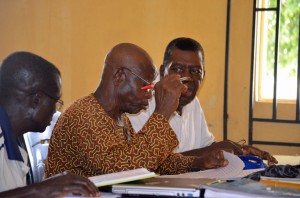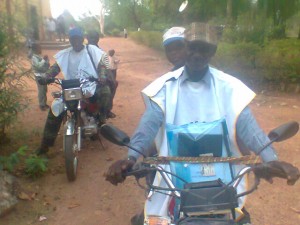Each Word is Important
This story is copied from a letter I received from Bob Creson, President of Wycliffe USA. He writes about how it is important to communicate each word clearly when translating Scripture.
“Mbe is a translation project facilitated by The Seed Company and is a partnership with the Ogoja Language Commission, church denominations in the area, The JESUS Film Project, Lutheran Bible Translators, the Great Commission Movement, and the Luke Partnership.
As the Mbe translation team in Nigeria was translating the Gospel of Luke, they came to chapter 2, verse 7, where Luke describes the first moments of Jesus’ earthly life: “She [Mary] gave birth to her first child, a son. She wrapped him snugly in strips of cloth and laid him in a manger, because there was no lodging available for them.”
The translators took time to ponder how to translate some of the words, but not “manger.” They immediately used the word “ókpáng.”
“What’s an ókpáng?” asked their consultant, John Watters. “Tell me what it looks like.” One of the translators drew a picture on the whiteboard. It was essentially a cradle hung by ropes so that the newborn could be laid in it and swung.
“Read the Translator’s Notes again,” John suggested. “What do the notes say about the manger?” (“Translator’s Notes” is a series of commentaries in non-technical English that are especially helpful for Bible translators for whom English is a second language.)
The Mbe translators read the notes and saw that “manger” referred to an animal feeding trough. Joseph and Mary apparently stayed near the animals, since there was no room for them in the part of the house where people usually stayed, and so Jesus’ first bed was an animal feeding trough.
Even as the Mbe team read the notes, they objected. “We have always used the word ókpáng. We have used it for years, and that’s what we should use.”
John pointed out to them that it wasn’t just a matter of tradition. God expects us to find the words that express the original meaning as accurately as possible. Furthermore, this word tells us something profound about God. “When He came to live among us and bring salvation to us, He came in the lowliest way possible. He did not come and sleep in a nice ókpáng like every
Mbe mother wants for her newborn. Instead, He showed us his unbelievable humility,” John told them. “So we need to find your best word for an animal feeding trough.”
Suddenly the one who had argued most loudly for the traditional term offered, “We feed our animals out of an old worn-out basket that is not usable anymore except to feed the animals. We call it ‘ɛ́dzábrí.’”
“Then try that term,” said John. “Put it in your rough draft and test it with Mbe speakers.”
The next weekend they read the story of Jesus’ birth to all kinds of church groups and individuals in Mbe villages. Often people asked about the word for manger. They understood what ɛ́dzábrí meant, but they weren’t sure it was the right choice. “We always say they laid Jesus in an ókpáng,” they said.
Each time they were asked, the translation team explained the reason they had chosen the new term. Jesus really did lie in a place where they fed animals. In this way, He demonstrated the humility that would characterize His years on earth.
As the Mbe people listened, they were visibly moved. Picturing the newborn Baby lying in the animals’ feeding basket, they recognized in a new way that Jesus was willing to do whatever it took to reach them. As an adult, He would humble Himself by washing the disciples’ feet and then by dying on the cross. And this humility started right from birth, when He was born to a young peasant woman under questionable social conditions and laid in an animal feeding trough.
No word in Scripture is too unimportant to translate carefully and accurately. Even the word for a baby’s bed—accurately translated—can show people the lengths to which God will go to reach them, to reach us.
And no language community is too unimportant to merit the Scriptures in the language they best understand. John says, “Translation in the heart language respects the people who speak it, and through the process it frees them to have a relationship with God in their own words and terms.”
There is nothing God wants to say to a language community that He cannot say in their own language. The translated Word frees people to respond to the God who humbled Himself for them, and it frees them to worship the exalted God in the language that best expresses their joy and adoration. One day every knee will bow and every tongue—speaking every language—will confess that Jesus Christ is Lord.”





